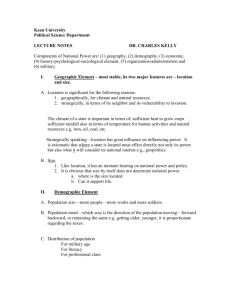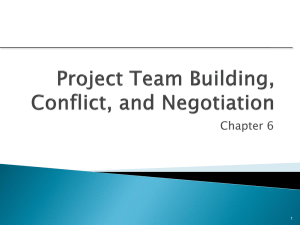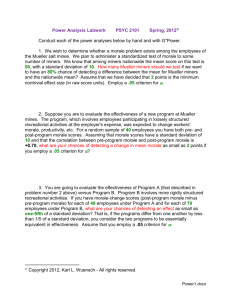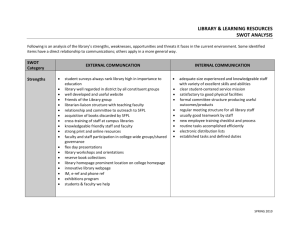Velasco - THE LEVEL OF EMPLOYEE MORALE AT THE BENGUET
advertisement
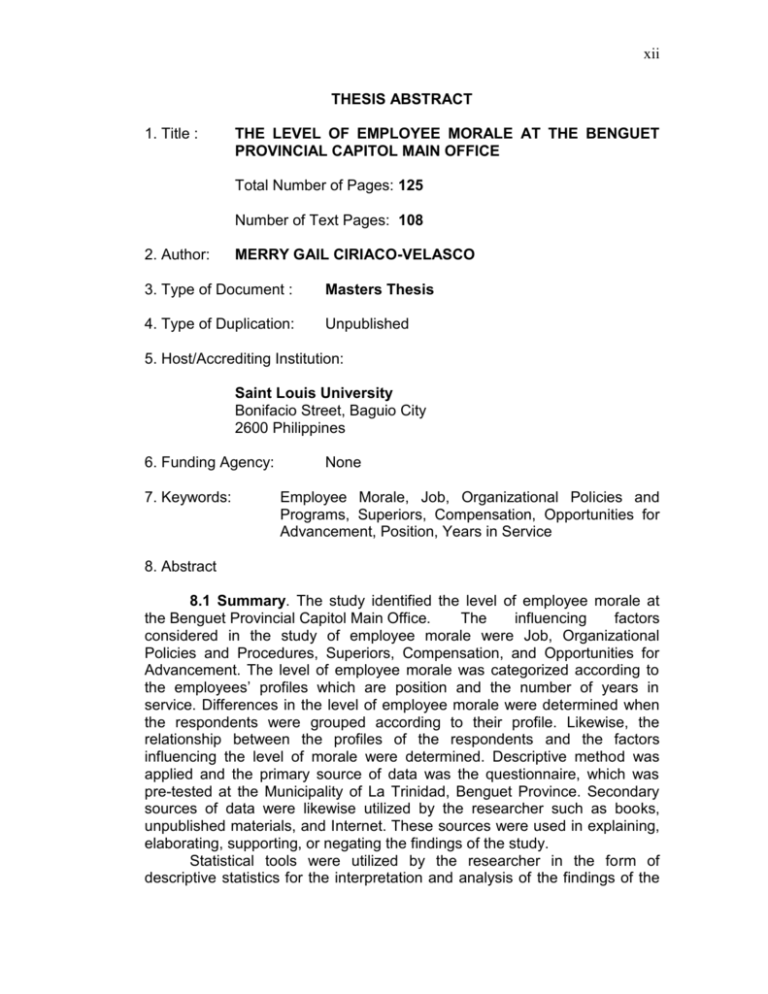
xii THESIS ABSTRACT 1. Title : THE LEVEL OF EMPLOYEE MORALE AT THE BENGUET PROVINCIAL CAPITOL MAIN OFFICE Total Number of Pages: 125 Number of Text Pages: 108 2. Author: MERRY GAIL CIRIACO-VELASCO 3. Type of Document : Masters Thesis 4. Type of Duplication: Unpublished 5. Host/Accrediting Institution: Saint Louis University Bonifacio Street, Baguio City 2600 Philippines 6. Funding Agency: 7. Keywords: None Employee Morale, Job, Organizational Policies and Programs, Superiors, Compensation, Opportunities for Advancement, Position, Years in Service 8. Abstract 8.1 Summary. The study identified the level of employee morale at the Benguet Provincial Capitol Main Office. The influencing factors considered in the study of employee morale were Job, Organizational Policies and Procedures, Superiors, Compensation, and Opportunities for Advancement. The level of employee morale was categorized according to the employees’ profiles which are position and the number of years in service. Differences in the level of employee morale were determined when the respondents were grouped according to their profile. Likewise, the relationship between the profiles of the respondents and the factors influencing the level of morale were determined. Descriptive method was applied and the primary source of data was the questionnaire, which was pre-tested at the Municipality of La Trinidad, Benguet Province. Secondary sources of data were likewise utilized by the researcher such as books, unpublished materials, and Internet. These sources were used in explaining, elaborating, supporting, or negating the findings of the study. Statistical tools were utilized by the researcher in the form of descriptive statistics for the interpretation and analysis of the findings of the xiii study. Descriptive statistics such as: percentages, averages, weighted mean, and frequency distribution were used. Friedman’s test was in testing the significant difference in the level of employee morale when the respondents were grouped according to position and the number of years in service. Chisquare was used to test the relationship between the factors influencing employee morale and the employees’ position and the number of years in service. 8.2 Findings: There were 340 respondents in the study. As to position, the rank and file are composed of 172 or 82.69 % of the respondents, 24 or 11.54 % are supervisors, and 12 or 5.77 % are department heads. As to years in service, 93 or 44.71% belong to the 0-10 years in service, 78 or 37.50 % belong to the 11-20 years in service, 31or 14.90 % belong to the 21-30 years in service and 6 or 2.88 % belong to the 31 and above years in service. As to the level of employee morale, the level of morale is low as to organizational policies and programs and compensation, moderate level as to superiors and opportunities for development, and high level as to job. The over-all level of employee morale is moderate. As to the differences in the level of employee morale when the respondents were grouped according to their position, the study manifested that regardless of the employee’s position, the level of morale did not differ as to job, organizational policies and programs, superiors, compensation, and opportunities for development. When the respondents were grouped according to the number of years in service, there were differences as to job and superiors. On the other hand, the study showed that there is no significant difference as to organizational policies and programs, compensation, and opportunities for development. As to the relationship between the respondents’ position and the factors influencing employee morale, the study showed that there is no relationship between the employees’ position and job, organizational policies and programs, superiors, compensation, and opportunities for advancement. When the respondents were grouped according to years in service, the study indicated that there is a relationship between job, superiors, and the employees’ length of service. There is no significant relationship between the number of years in service and organizational policies and programs, compensation, and opportunities for advancement. 8.3 Conclusion. Based on the findings, most of the respondents are rank and file who have been serving in the agency for 0-10 years. The level of employee morale at the Benguet Provincial Capitol main office is generally moderate. Specifically, the level of morale is high for job, moderate for superiors and opportunities for development, and low for compensation and organizational policies and programs. Regardless of the employees’ position, the level of employee morale as to job, organizational policies and programs, superior, compensation, and xiv opportunities for advancement does not significantly differ. Regardless of the number of years in service, employee morale does not differ as to organizational policies and programs, compensation, and opportunities for advancement. Significant difference was observed for job and superiors. No relationship was observed between the employees’ position and job, organizational policies and programs, superiors, compensation, and opportunities for advancement. As to the relationship between the number of years in service and the employees’ profiles, significant relationship was observed between number of years in service and employees’ job and superiors. No relationship was observed between the number of years in service and organizational policies and programs, compensation, and opportunities for development 8.4 Recommendations. Based on the findings and conclusions of the study, the researcher recommends the following: Improve the level of morale in the agency by improving on the different areas influencing employee morale. As to job, consider job enrichment to avoid boredom among the employees. This will also allow employees to grow and learn other tasks being handled by other workers. The agency should also consider having additional learning and exercise activities to help the employees relax. As to organizational policies and programs, committees should be created to strictly monitor and implement the organizational policies such as hiring and recruitment procedures. The Civil Service Commission should also come up with an audit team to check on the implementation of policies especially on hiring. Participation of employees’ family members in the various agency programs is also recommended. As to superiors, it is recommended that re-orientation or leadership trainings be provided to enhance their current skills and relationship with their subordinates. This training should include enhancing employee relationships or teambuilding, communication, coaching, and the like. As to compensation, it is recommended that salary grades be reviewed and updated. Salary increase or adjustments should also be given regularly due to yearly increase in cost of living. Additional benefits should also be explored and be added to the current benefits being received by the employees. As to opportunities for development, the agency should also explore other ways on how employees could learn continuously from their own field while minimizing expenses. Training and development especially of the staff employees should be implemented. They should be given opportunities to facilitate various programs in the agency to develop leadership skills. Lastly, conduct similar studies that will cover a wider scope of respondents or population. Similar studies that will compare employee morale between government and private employees is also recommended.

